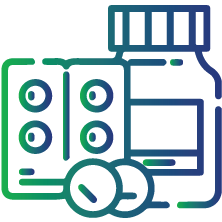
Total Iron Binding Capacity (TIBC)
Total Iron Binding Capacity (TIBC)
Total Iron Binding Capacity (TIBC) test is used to measure how well the blood binds to iron and is transported within the body. Iron is an essential micronutrient for making red blood cells (RBCs) which carries oxygen from the lungs to the rest of the body. Iron is also essential for healthy bone marrow, organ, and muscle function. Serious health issues such as cirrhosis and anemia can be caused due to high or low iron levels.
Iron is a component needed for haemoglobin production, which is a type of protein in RBCs. Iron is also found in myoglobin, a protein that carries and stores oxygen specifically in muscle tissues. It plays a vital role for the brain development and growth in children, and is necessary for the normal production and function of various hormones
This test is included as part of iron tests that are performed during routine check-ups to check for anaemia caused due to iron deficiency. These tests are used to analyze the capacity of the blood to transport iron. Thus, early detection and treatment of iron deficiency or overload can help prevent serious health conditions
This test is also known as
Serum Iron-Binding Capacity, Siderophilin, TIBC, UIBC, Iron Binding Capacity, IBC
Symptoms of low iron levels

Pale skin

Fatigue

Dizziness

Shortness of breath

Rapid heartbeat
Symptoms of high iron levels

Joint pain

Stomach pain

Weight loss

Low energy
What is Total Iron Binding Capacity (TIBC) test used for?
A Total Iron Binding Capacity (TIBC) test is done:

To check if you have low levels of iron (anaemia)

To check if you have high levels of iron (hemochromatosis) This is a rare genetic disorder that causes too much iron to build up in the body

To monitor whether treatments for iron deficiency (low iron levels) or excess iron (high iron levels) are working
Test preparation:
Total Iron Binding Capacity (TIBC) test requires fasting for up to 8-12 hours before the test. Only drinking water during this time is recommended. Certain medicines may affect the results of this test, therefore ask your doctor for details about pretest preparations and make sure to follow instructions closely.
Interpretation of the results:
The test results are usually measured in Micrograms Per Deciliter (mcg/dL) or Micromoles Per Liter (micromol/L)
|
Parameters |
Normal values |
|
Total iron binding capacity (TIBC) |
240 to 450 mcg/dL (or) 42.96 to 80.55 micromol/L |
Higher than normal level of iron may be a sign of:
· Excess iron (hemochromatosis) in the body
· Anaemia due to red blood cells being destroyed quickly (haemolytic anaemia)
· Liver tissue death
· Inflammation of the liver (hepatitis)
· Iron poisoning
Lower than normal level of iron may be a sign of:
· Long-term digestive tract bleeding
· Heavy menstrual bleeding
· Intestinal conditions causing poor absorption of iron
· Iron deficiency in diet
· Types of anaemia
· Inherited blood disorder causing the body to make fewer RBCs (Thalassemia)
FAQs
How is the sample collected for an Iron Binding Capacity (TIBC) test?
A blood sample is collected from a vein in your arm using a small needle. Usually, this process does not take more than 5 minutes
What is the turnaround time (TAT) for the result of an Iron Binding Capacity (TIBC) test?
You will usually get the test result on the same day as the collection of the blood sample
Should I be concerned if my Iron Binding Capacity (TIBC) test result is abnormal?
You may have a medical condition if the results of your Iron Binding Capacity (TIBC) test show that you have high or low levels of iron circulating in your body. Your iron levels can also be influenced by other factors, such as diet and inflammatory medical conditions. Your healthcare provider will discuss your results with you and may even recommend additional tests to identify the reason for your abnormal iron levels
Who are at high risk for anaemia?
Some people are more susceptible to anemia than others; for example, women who are pregnant or nursing, children in puberty stage, vegans, people with chronic illnesses like cancer or stomach ulcers, etc
What factors can affect the results of an Iron Binding Capacity (TIBC) test?
The Iron Binding Capacity (TIBC) test may be affected by common medications such as birth control pills, antibiotics, aspirin, chemotherapy medicines, estrogen, and testosterone

